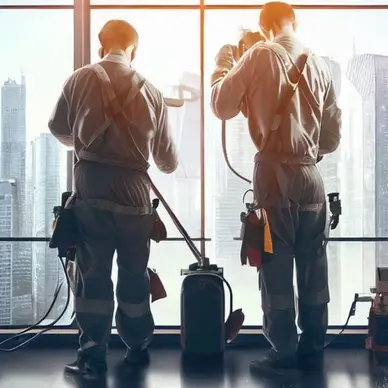Have you ever walked into a place and felt calm and relaxed right away? Or maybe a certain smell has given you more energy and helped you concentrate.
If so, you may have used aromatherapy without even knowing it.
And if you already have a humidifier, you're in luck: by adding a diffuser to it, you can take your aromatherapy to the next level.
In this piece, I'll talk about diffusers and how they can help you feel better all around.
So relax, take a deep breath, and let's dive in.
Understanding Diffusers

A diffuser is a device that spreads essential oils into the air, filling a room with tiny, helpful essential oil particles that can be breathed in.
The diffuser's job is to spread the particles out widely in a way that makes it easy to breathe and doesn't make the room too stuffy.
There are four kinds of diffusers: nebulizing, ultrasound, evaporative, and heat diffusers.
Essential oils are spread through the air by each type of diffuser in a different way.
Types of Diffusers
- Nebulizing diffusers use air pressure and a series of tubes to diffuse essential oils into the air.
- Ultrasonic diffusers use ultrasonic vibration in the water tank to create microfine essential oil particles that partner with a water molecule as they rise up and through the nozzle and deliver essential oils into the surrounding space in the form of mist.
- Evaporative diffusers disperse essential oils into the air using molecular diffusion.
- Heat diffusers use heat to evaporate essential oils into the air.
Benefits of Using a Diffuser
By taking advantage of the benefits of essential oils, diffusers are used to improve health and well-being.
Different essential oils claim to do different things.
Lavender, for example, is supposed to help you sleep.
The smell of essential oils is strongly connected to memories, and diffusing them can make a room feel calmer and smell better.
A diffuser for essential oils can also help you focus and remember things better.
Essential oil diffusers can lower the chance of strokes, mood swings, and other health problems without hurting the person.
Also, breathing essential oils can help to calm your emotions, improve your mood, and make you feel better overall.
Using a diffuser has a lot of benefits, such as:
- Improving mood
- Reducing stress and anxiety
- Promoting better sleep
- Boosting the immune system
- Improving breathing
- Enhancing cognitive function
Diffusing essential oils can also help get rid of bad smells and pathogens in the air, giving the room a more nice smell.
Many essential oils are thought to be useful in medicine or therapy, like peppermint for colds and breathing problems.
In general, having an essential oil burner in your home has many benefits.
They are easy for anyone to use and can help everyone.
With all the different ways essential oil diffusers can be used around the house, they can help people go to the doctor less, save money on their power bills, drink less coffee, and be more productive.
The Importance of Aromatherapy in Your Humidifier
Aromatherapy is the use of essential oils to promote physical and psychological well-being.
When combined with a humidifier, it can provide a more effective and holistic approach to improving air quality and overall health.
Essential oils such as lavender, eucalyptus, peppermint, and tea tree oil can be added to your humidifier to help alleviate stress, improve sleep, relieve congestion, and boost immunity.
The humidifier disperses the essential oils into the air, allowing you to breathe in the therapeutic benefits.
It is important to note that not all essential oils are safe to use in a humidifier, and it is recommended to do proper research before use.
Incorporating aromatherapy into your humidifier routine can greatly enhance the benefits of using a humidifier and improve your overall well-being.
For more information:
Discover Aromatherapy Diffusers: Benefits, Use & SafetyDiscover Aromatherapy Diffusers: Benefits, Use & Safety
Choosing the Right Diffuser
Types of Diffusers
Diffusers are tools used to spread essential oils into the air for different reasons.
There are two major kinds of diffusers: ones for HVAC systems and ones for essential oils.
HVAC Diffusers
HVAC systems use diffusers to send hot or cold air to different rooms. Most HVAC diffusers are one of six types:
- Directional diffuser
- Linear slot diffuser
- Round diffuser
- Swirl diffuser
- Double deflection diffuser
- Jet diffuser
Each diffuser is different and can be used for different things.
Diffusers are made to control airflow in a specific way, while grilles aren't usually thought of as having anything to do with airflow control.
Essential Oil Diffusers
Essential oil diffusers can be used for aromatherapy, to make the air smell better, and to help people rest.
There are four main kinds of diffusers for essential oils:
- Nebulizing diffusers
- Water diffusers
- Fan-style diffusers
- Candle diffusers
Nebulizing diffusers are the most powerful kind of essential oil diffusers.
They don't use heat or water to spread the oil, so they are also the most environmentally friendly.
Essential oils are spread through the air by water diffusers that use water and movements to make a fine mist.
Fan-style diffusers have a fan that blows across the oils to spread the smell.
In a candle diffuser, a candle warms the oil and lets out the smell.
Reed diffusers and passive diffusers are two other kinds of essential oil diffusers that you can buy.
Reed diffusers use reeds to soak up the oil and spread the smell into the air.
Passive diffusers don't need water or power, and they come in different styles.
Choosing the Right Diffuser
Choosing the right diffuser for your needs depends on a number of things, such as the size of the room, your money, and your own preferences.
Room Size
First, figure out how big the room or place is where you want to use the diffuser.
A small diffuser will work in small areas like bathrooms or offices.
For bigger rooms like living rooms or bedrooms, you'll need a bigger fan that can cover more space.
If the room is very big, you may need a bigger diffuser or more than one to get the look you want.
Budget
Diffusers cost anywhere from less than $20 to more than $100, so figure out how much you want to spend before you go shopping.
Before buying a diffuser, it's also a good idea to read reviews, since some diffusers may need to be changed often.
Personal Preferences
When picking the right silencer, you should also think about what you like.
Diffusers come in a wide range of styles and names, and each one has its own set of features and look.
Some diffusers release essential oils into the air by using heat or water, while others use nebulizers to turn the oil into a fine mist.
People often think that nebulizing diffusers are the best because they don't change the healing effects of the essential oils.
But they are also more expensive and take more work to keep up.
In the end, the best diffuser for you will depend on your own personal tastes and wants.
It's important to look into different models and find one that fits your wants and your budget.
Maintenance and Safety
Using a Diffuser with Essential Oils
A diffuser is a gadget that spreads essential oils into the air so that you can breathe them in and get the health benefits.
There are many different kinds of diffusers, such as clay, electric, candle, lamp ring, reed, and ultrasonic.
An ultrasonic diffuser, which uses water and sound waves to spread essential oils into the air, is the most popular type of diffuser for essential oils today.
Using Pure Essential Oils
It's important to remember that a diffuser should only be used with pure essential oils.
Using other oils, like perfumed oils or food oils, can make aromatherapy work in a way that you don't want.
They might not spread the other oils as well, or they might smell bad.
More importantly, using other oils could clog or break the diffuser, which would void the guarantee on the diffuser.
For the best results, it is best to use essential oils that are confirmed to be pure and organic.
Cleaning Your Diffuser
It is suggested that you clean your essential oil diffuser on a daily basis to keep it in good shape.
After each use, wipe the tank clean with a microfiber cloth or a Q-tip to get rid of any oil or water that might have gotten inside.
This will help keep the essential oils from building up too much.
Deep Cleaning Your Diffuser
It's also important to give the diffuser a good clean once or twice a month to get rid of dust and buildup that can make it less effective.
To really clean the diffuser, unplug it and pour out any water and oil mixture that is still in the tank.
Then, add half a cup of water to the reservoir and a few drops of all-natural dishwashing soap.
Let the diffuser run for a few minutes so that the cleaning solution can get around.
Drain the water from the tank and wash it well with water.
To dry the diffuser, use a soft cotton or microfiber cloth.
To clean the diffuser, you can also use rubbing alcohol.
Put rubbing alcohol on a cotton swab and use it to clean all the parts of the diffuser.
Put the essential oil you want to use in the burner and let it work.
Preventing Mold and Mildew
It's important to know that mold and mildew germs can grow in water that has been sitting for a while.
So, to prevent buildup, it is best to rinse or wipe out your diffuser after every use.
Benefits of Diffusing
Diffusers versus Humidifiers: Understanding the Differences
Two popular household items that use water to work are diffusers and humidifiers.
But they are both used for different things and have different results.
Knowing how the two are different can help you choose the right device for your needs.
Diffusers: Adding Fragrance and Therapeutic Effects
Diffusers are made to add scent to the air and help people feel better in small to large rooms, offices, and hospitals.
They use essential oils, which might help with stress, trouble sleeping, and some illnesses.
Most diffusers are small gadgets that are made to be used with essential oils.
The sizes range from 15 ml to 300 ml.
Essential oil diffusers can help the respiratory system by making the air more humid and giving you the benefits of the essential oils you choose to spread.
But there are no written studies that look at how essential oils diffused in the air affect asthma.
People with and without asthma have both said that diffusing different essential oils made their breathing problems worse.
Based on this, people with asthma should be careful when using essential oil diffusers.
Humidifiers: Relieving Dry Air Discomforts
Humidifiers, on the other hand, are made to help with problems caused by dry air, like dry skin, a sore throat, and a stuffy nose.
Most of the time, they have a bigger water tank, like 1 gallon.
Humidifiers come in sizes from those that fit on a desk to those that are used in factories.
Children and people with asthma or allergies may find it easier to breathe when the humidity is higher.
This is especially true when they have a respiratory infection like a cold.
But you should talk to your doctor before using a humidifier if you or your child has asthma or allergies.
When humidifiers and filters are dirty, germs and mold can grow quickly, which can be bad for your health.
To avoid these risks, it is important to keep humidifiers clean.
Types of Humidifiers
Warm mist humidifiers use an electric heating element to turn water into a warm steam mist.
Cool mist humidifiers and diffusers work in the same general way.
Both heat water by using an electronic part called an ultrasonic transducer, which is generally a piezoelectric element and works at a very high frequency.
Diffuser vs. Humidifier
Using a Diffuser Safely
Essential oils are often used in oil diffusers so that people can get the most out of them.
But it's important to use them in a safe way so you don't hurt yourself.
Here are some things to keep in mind about safety:
- Burns and Minor Allergic Reactions: The risk of harm is mostly limited to superficial things related to device function, such as burns and minor allergic reactions. It is vital to avoid diffusers that use open flames for safety reasons. It is also important to clean the diffuser after each use to prevent oil buildup.
- Malfunction: There is a chance that the diffuser may malfunction, and the user could get burnt due to incorrect handling of the device.
- Allergy Symptoms: The effect of essential oils varies from person to person, and the main and most immediate health consequence of using essential oils is probably allergy symptoms. If you have allergies, asthma, or a similar condition, diffusing essential oils, which have strong fragrances, may trigger respiratory reactions.
- Avoid Diffusing Around Certain Groups: Therefore, it is recommended not to diffuse oils around newborns, babies, young children, pregnant or nursing women, or pets unless you are sure they are safe.
Proper Use of a Diffuser
Follow these steps to use a diffuser the right way:
- Proper Dilution: It is important to follow proper dilution guidelines. Essential oils are highly concentrated and should be diluted before use.
- Well-Ventilated Area: Diffuse in a well-ventilated area to avoid any respiratory reactions. Only diffuse in well-ventilated areas, and keep all essential oils away from flames.
- Intermittent Diffusing: Diffuse intermittently, typically 30 to 60 minutes on, then 30 to 60 minutes off. This will help prevent any potential harm and ensure that you are using the diffuser safely.
If you follow these rules, you can use a diffuser to get the benefits of essential oils in a safe way.
Maximizing Your Diffuser
Tips for Getting the Most Out of Your Diffuser
To get the most out of a diffuser and all of its benefits, it's important to follow some tips and best practices.
These tips can help you get the most out of your diffuser and make it last longer.
Placement
When you use a diffuser, it's important to think about where to put it.
For example, if you use a Scentsy diffuser, you should put it in an open area, away from walls or fabrics, so it doesn't stain or get damaged.
In the same way, if you use a reed diffuser, it's important to put it in a well-ventilated area so that the scent lasts as long as possible.
Mist Settings
To get the most out of your diffuser, it's also important to choose the right mist setting.
There are three levels on a Scentsy diffuser: high, low, and intermittent.
Depending on how thick the oil is and where it is used, the scent can last anywhere from 4 to 8 hours.
In the same way, moving the porous reeds in a reed diffuser can help naturally scent the air and make the fragrance last longer.
Maintenance
It's important to take care of a diffuser so that it works well and lasts longer.
When cleaning a diffuser, you should wipe the reservoir down with a clean microfiber cloth and use a combination of water and vinegar to get rid of any leftover water and essential oils.
It is also important to clean the leftovers with a cleaning brush or cotton swab dipped in pure white vinegar to cut through any oil deposits that may still be on the diffuser.
Note: Please keep in mind that the estimate in this article is based on information available when it was written.
It's just for informational purposes and shouldn't be taken as a promise of how much things will cost.
Prices, rates, and fees can change because of things like market changes, changes in regional costs, inflation, and other unforeseen circumstances.
Conclusion

In conclusion, diffusers are a great way to add aromatherapy to your daily life.
Diffusers can help you reach your goals, whether you want to relax after a long day at work or get more energy in the morning.
But it's important to keep in mind that not every diffuser is the same.
When looking for a diffuser, you should think about things like size, design, and how it works to make sure you get the right one for your needs.
Aromatherapy is a strong tool that can help our physical and mental health in many ways.
So, if you already have a humidifier or are thinking about getting one, take some time to learn about aromatherapy and see for yourself how it can help.
Who knows, you might find that your new diffuser is an important part of your daily life, giving you a sense of calm and rest you didn't know was possible.
Looking for a new Humidifier?
Choosing a gadget can be very difficult if you know nothing about the technology.
Some will pay for features they do not need while others may not consider what they really want.
So I created this quick, newbie guide to help you focus on what is really important to you:
The Best Humidifier (For You!)The Best Humidifier (For You!)Links and references
My article on the topic:
Aromatherapy with Humidifiers: Benefits & SafetyAromatherapy with Humidifiers: Benefits & Safety

